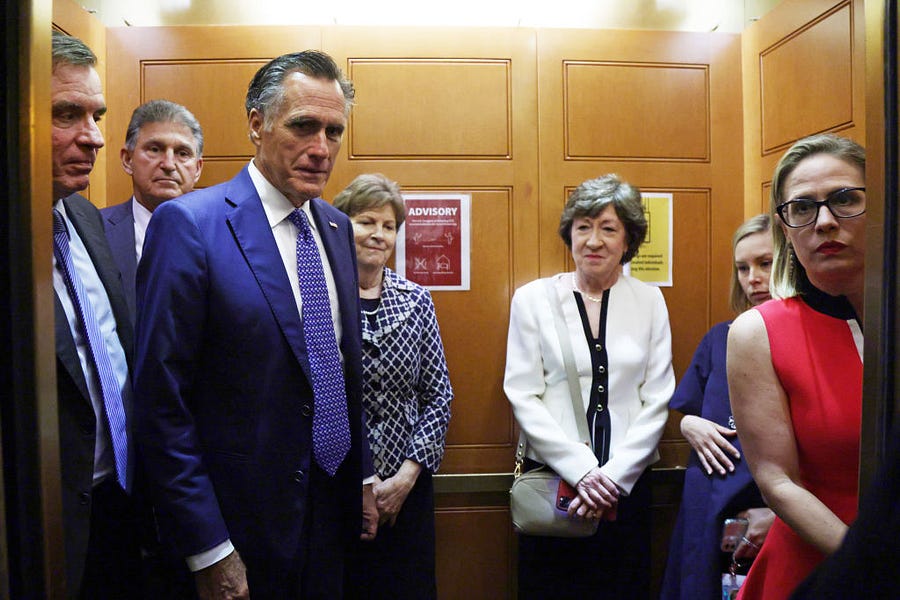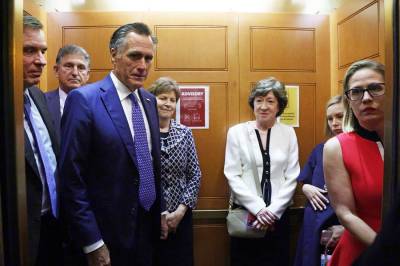Good morning.
The House is back after three weeks away, and the chamber will look and operate more like it did pre-pandemic than at any other time in the past year. Several coronavirus restrictions and practices are coming to an end: Vaccinated lawmakers don’t have to wear masks or social distance on the House floor during debate and votes. Those who are not fully vaccinated are still required by the attending physician to wear masks and maintain distance from others on the floor, in meetings, and in committee hearings.
Votes will also move more quickly. Members have been voting in alphabetical groups for months to limit the number of people on the House floor at any given time. Votes that used to conclude in short order slowed to a crawl under the new rules. House Majority Leader Steny Hoyer announced last week that votes will now be open for a total of 20 minutes and members will not have to vote in small groups any longer.
House Democrats, who have been meeting exclusively in phone conferences, also held their first in-person meeting since March 2020 earlier this morning. Republicans have been meeting in person for a while in a larger space than they typically use, and members have been able to call into the meeting instead of going in person. Democrats’ meeting today was in that same larger room, and members also had the option to participate virtually.
Infrastructure Talks
Negotiators from a bipartisan group seeking an infrastructure compromise will pitch their colleagues on their plan this afternoon, as Democrats try to determine next steps in pursuing President Joe Biden’s agenda.
Five Republicans who are involved in the talks will present details of the proposal during the Senate Republican lunch today, and the five Democrats involved will discuss it at their own party’s lunch gathering.
The talks, led by Sens. Kyrsten Sinema and Rob Portman, have resulted in a framework totaling $1.2 trillion over eight years, with $579 billion of that being new spending. It’s more in new spending than a previous GOP offer from Sen. Shelley Moore Capito, but it is still lower than the $1.7 trillion Biden wants. The bipartisan package would focus on investments like roads, bridges, airports, and broadband.
The biggest hangup—how to pay for the bill—still remains unresolved. The senators have suggested it could be financed by repurposing unspent money from prior coronavirus relief bills, such as the funds for enhanced unemployment benefits that some states are now forgoing. Other potential measures include boosting tax enforcement and imposing fees similar to the fuel tax on electric vehicles, based on mileage driven.
The plan could easily fall apart like the previous iteration of White House-GOP talks. But Senate Republican leaders notably haven’t shot it down yet.
"I think there would be substantial Republican support," Sen. John Thune, the Republican whip, said Monday of the plan as it has been described thus far.
And Iowa Republican Sen. Joni Ernst told The Dispatch that she’s “glad to see that we have a bipartisan group that’s really coming to a consensus.”
“A lot of us will have to sort through the bill, but I’m glad it’s focused on what we consider infrastructure,” she added.
A Republican senator involved in the discussions but speaking on the condition of anonymity told The Dispatch the bipartisan group’s goal is to pull together something like 30 Democrats and 30 Republicans (or 40 Democrats and 20 Republicans) to reach the 60-vote threshold for passage, rather than relying on every Democrat and just 10 Republicans to pass it.
Some Democrats are already signaling they won’t support the bipartisan offer if it advances to a floor vote. Progressives would largely prefer to proceed with one large bill on a partisan basis, and they are growing anxious that a smaller deal on traditional infrastructure could make it harder to win needed support from moderate Democrats to pass some of Biden’s other priorities, like child care and free community college. Several Democratic senators made clear last week that they won’t support an approach that doesn’t include robust climate change provisions.
There’s also a desire to move quickly.
Sen. Brian Schatz, a Hawaii Democrat, told reporters Monday night that he expects members will “know a lot more on the path forward on infrastructure by the end of the week.”
He said he’s been encouraged by conversations he’s had with the White House and with Senate Majority Leader Chuck Schumer that they understand climate provisions must be included. “There may be a multi-step process, which would be OK as long as it’s not a player to be named later and that may never end up happening,” Schatz said. “But I think the leader understands that concern.”
Schumer said on the Senate floor Monday that discussions about infrastructure investments are progressing on two tracks: one bipartisan, and another that could be considered under the budget reconciliation process, which would not require support from Republicans to pass.
Democrats have a very narrow margin for disagreement in the House if they are to consider a bill without any Republican support. House Speaker Nancy Pelosi can only afford to lose a handful of her members. That’s already looking like a tough needle to thread, especially when considering the sheer scope of Biden’s ambitions. He is calling for Congress to pass roughly $4 trillion in sweeping social investments and infrastructure spending.
Five House Democrats—enough to tank a Democratic-only bill if they oppose it—wrote in a letter to Pelosi yesterday that they are “deeply concerned with the fiscal state of our nation.”
“As we continue to have a national conversation about major infrastructure spending and necessary investments to support hardworking American families, we believe it is critical that we do so responsibly and take meaningful steps to get our fiscal house in order,” they said.
And in the 50-50 Senate, Democrats have no margin for disagreement at all.
All eyes are on West Virginia Democrat Joe Manchin and Arizona Democrat Kyrsten Sinema for assurances that they will support a reconciliation package even if a bipartisan infrastructure bill is passed separately.
“We’re looking at everything,” Manchin said when asked about it Monday. “I just want to see what the bills are.”
House to Vote on 2002 AUMF Repeal
Congress will move one step closer to repealing an outdated war authorization this week.
The House will soon vote to repeal the 2002 authorization for the use of military force behind the 2003 invasion of Saddam Hussein’s Iraq. House members have voted several times in recent years to take the authorization off the books, but it has not had enough support to pass the Senate. Lawmakers from both parties—but primarily Democrats—view the AUMF as unnecessary and a potential avenue of abuse for the executive branch.
It’s still an uphill climb to final passage. But proponents of repealing the authorization have an ally in the White House, which explicitly backed the repeal bill on Monday.
“The Administration supports the repeal of the 2002 AUMF, as the United States has no ongoing military activities that rely solely on the 2002 AUMF as a domestic legal basis, and repeal of the 2002 AUMF would likely have minimal impact on current military operations,” the White House said. “Furthermore, the President is committed to working with the Congress to ensure that outdated authorizations for the use of military force are replaced with a narrow and specific framework appropriate to ensure that we can continue to protect Americans from terrorist threats.”
The House voted to repeal the 2002 authorization in its 2020 national defense authorization bill, but the provision didn’t make the final bill due to opposition in the then-Republican Senate. House members moved again to scrap the AUMF after President Donald Trump cited it as part of his justification for the January 2020 strike that killed Iranian Gen. Qassem Suleimani. Eleven Republicans voted alongside most Democrats for the measure. A few who opposed it in the 2019 annual defense bill amendment vote, including Reps. Mike Gallagher and Jaime Herrera Beutler, threw their backing behind the repeal in 2020.
Two new GOP freshmen—Reps. Peter Meijer and Nancy Mace—have also co-sponsored Democratic Rep. Barbara Lee’s bill and are expected to support it when it comes to the floor this week. Members have increasingly coalesced around the idea of repealing old war authorizations, including the earlier 1991 Gulf War AUMF and a broadly written 1957 authorization for force in the Middle East.
Far more difficult to reach consensus on is the 2001 AUMF, which still underpins much of the United States’ global war on terror. Lawmakers from both parties recognize the nearly 20-year-old authorization doesn’t translate well to the current terror climate, but a lack of political willpower to vote on a new authorization and disagreements over how narrow a new bill should be have derailed efforts to replace it for years.
Sen. Tim Kaine, one of the leading proponents of repealing the 2001 authorization, told The Dispatch earlier this year that he hopes to make progress in negotiations over a potential replacement ahead of the 20-year anniversary of the terror attacks of September 11, 2001.
The Virginia Democrat said in an interview with Defense News last week that he’s still aiming for that timeline.
“There’s a lot of Democrats and Republicans who believe, 20 years in, if we can’t show them we’ve learned something and make it more precise, shame on us,” Kaine said.
On the Floor
The Senate will vote on several nominations this week, including Lina Khan’s nomination to the Federal Trade Commission and Kiran Ahuja to lead the Office of Personnel Management.
The House is set to vote on Rep. Barbara Lee’s 2002 AUMF repeal legislation. Members will also consider a bill to award congressional gold medals to the U.S. Capitol Police force and the D.C. Metropolitan Police Department for protecting the Capitol on January 6. The full slate of bills the House will vote on this week is available here.
Key Hearings
Several top officials who were involved in the response on January 6 will testify before the House Oversight and Reform Committee at 2 p.m. today. Information and livestream here.
Two House Homeland Security subcommittees will hold a hearing on the federal response to the Colonial Pipeline ransomware attack this afternoon. Information and livestream here.
NASA Administrator Bill Nelson will appear before a Senate Appropriations subcommittee to discuss the Biden administration’s budget request at 2 p.m. today. Information and livestream here.
Health and Human Services Secretary Xavier Becerra will testify before the House Education and Labor Committee tomorrow morning. Information and livestream here.
Michael Bolton, inspector general of the U.S. Capitol Police, will testify at a Senate Rules hearing on oversight of the force Wednesday afternoon. Information and livestream here.
A House Transportation and Infrastructure subcommittee will hold a hearing Wednesday afternoon on the Federal Aviation Administration’s role in the future of spaceflight. Several government officials and space industry representatives will appear. Information and livestream here.
Yuval Levin of AEI and Molly Reynolds of Brookings will testify before the House Select Committee on the Modernization of Congress on Thursday at 9 a.m. for a hearing on building a more civil and collaborative culture in Congress. Information and livestream here.
Treasury Secretary Janet Yellen will appear before the House Ways and Means Committee Thursday morning to discuss the Biden administration’s fiscal year 2022 budget request. Information and livestream here.







Please note that we at The Dispatch hold ourselves, our work, and our commenters to a higher standard than other places on the internet. We welcome comments that foster genuine debate or discussion—including comments critical of us or our work—but responses that include ad hominem attacks on fellow Dispatch members or are intended to stoke fear and anger may be moderated.
With your membership, you only have the ability to comment on The Morning Dispatch articles. Consider upgrading to join the conversation everywhere.